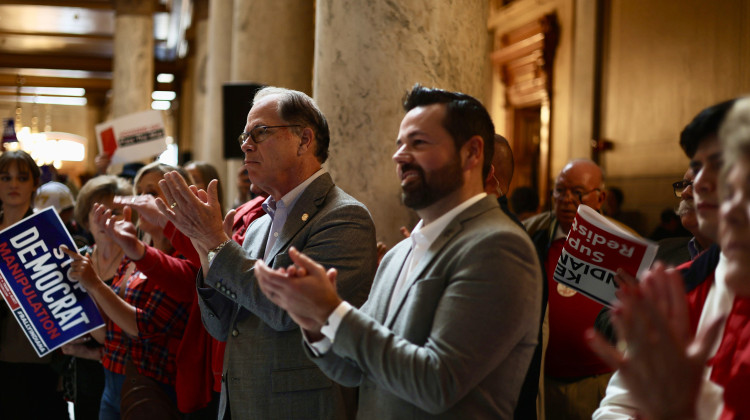
Santa, wearing a face shield, speaks with children wearing cloth face masks at the University Park Mall in Mishawaka.
Justin Hicks/IPB NewsThe Indiana State Department of Health reported 526 additional confirmed deaths over the last week – the most reported in a single week during the pandemic, by nearly 150 Hoosiers. That brings the state’s total to 5,944 confirmed deaths. ISDH also reported more than 48,000 new cases in the last week.
Since moving to Stage 5 of its reopening plan on Sept. 26, the state has reported 264,250 positive cases and 2,554 confirmed deaths – meaning 69.2 percent of the state’s total positive cases and 43 percent of deaths have been reported by the state in the last 71 days.
The state’s hospital census has dropped for the last five days, to 3,189 Hoosiers hospitalized with COVID-19 on Sunday – the lowest in two weeks.
Here are your statewide COVID-19 headlines from last week.
New COVID-19 Quarantine Guidance Should Get People Back To Work, School Faster
Indiana health officials say new COVID-19 quarantine guidance from the Centers for Disease Control and Prevention should help health care workers, teachers and students get back to work and school quicker.
Previously, the CDC said if you’re exposed to someone with the virus, you should quarantine for 14 days. But new guidance says, if you show no symptoms, you can end quarantine after 10 days.
And State Health Commissioner Dr. Kris Box said if you test negative for COVID-19 on days five, six or seven of your quarantine (and don’t have symptoms), you can end that quarantine at just seven days.
“I really think that this is going to help us get more kids back in school sooner, so I’m very, very excited about that," Box said. "And I think it’s going to give a comfort to our health care workers who are going back more quickly.”
Curtis Hill, Other Attorneys General Ask Congress For CARES Act Extension
Indiana Attorney General Curtis Hill and four dozen other attorneys general from around the country want Congress to extend the deadline to use federal COVID-19 relief dollars.
The National Association of Attorneys General sent a letter to congressional leaders last week.
Congress passed the CARES Act in late March, sending trillions of dollars to the states to help address the COVID-19 pandemic. The states are required to spend the money on expenses directly related to battling the virus – and those expenses must be incurred between March 1 and Dec. 30 of this year.
State budget leaders have said for months they’ve asked for more flexibility in those funds, and to extend that deadline. Now, the country’s attorneys general are joining that call.
Scott County Health Officials: Communication, Messaging Key To Curbing COVID-19 Spread
As COVID-19 cases continue to surge across the state, some counties are tailoring public health messages to resonate with residents. Scott County officials say direct communication with communities has been key to helping curb the virus’ spread.
The county health department says they learned the importance of direct community outreach and communication after navigating their last public health emergency, an HIV-outbreak in 2015.
Michelle Matern, with the Scott County Health Department said state mandates feel aimed at more populated counties – and what works in Marion County doesn’t necessarily work in Scott County. She said local mandates, especially those related to businesses, have been important for the county, because it helps officials adjust the mandates to fit the needs of residents.
“Overall, it’s a community effort. You have to have the community participate in the mandates and the rules and regulations to really stop the spread of this virus,” Matern said.
Indiana Hopes All Health Workers, Nursing Home Residents Get Vaccine By End Of Month
Indiana health officials say they hope to make a COVID-19 vaccine available to every health care worker and nursing home resident in the state by the end of December.
Drug makers Pfizer and Moderna are currently awaiting federal authorization for their vaccines.
Indiana Department of Health Chief Medical Officer Dr. Lindsay Weaver said the state hopes to get initial shipments as early as mid-December.
“That first week, our allocation is going to be smaller," Weaver said. "But then the next week, our goal – if we get the amount of vaccine that we’re hoping to get or that we have projected out through December – we’ll go ahead and open it up to all of our health care providers across the entire state.”
Hoosiers Seeking Unemployment Assistance On the Rise, Reflecting Virus Surge
New claims for unemployment benefits have been steadily rising since mid-October. Economists say it’s further proof that COVID-19 – not government restrictions – is hurting the economy.
The uptick in new unemployment claims almost mirrors the rise in coronavirus infections (although to a less pronounced degree) reported by the state. And even though there are fewer ongoing claims being filed, a sizable amount is from people who used up their 26 weeks of regular benefits.
Those claimants are now counted under Pandemic Emergency Unemployment Compensation, a temporary federal program that grants an additional 13 weeks of benefits.
Rachel Blakeman, director of the Community Research Institute at Purdue University Fort Wayne, said jobs exist when consumers have a demand for – or feel safe enough to use – those services. And as long as a deadly virus is raging through the state, people won’t be going out as much.
“Part of this is being driven by changes dictated by the government, but as much, if not more so, are changes being done by individual consumers,” she said. “So let’s remember that the economy is interconnected.”
School Financial Managers Say 2021 Legislative Session Will Make Or Break Their Budgets
Without additional emergency pandemic funding, the upcoming legislative session in Indiana will be critical, especially for schools.
Lawmakers will write the state's next two-year budget, with an expected loss of revenue because of the COVID-19 pandemic. School financial managers say they don't expect increases for education funding in the state's next budget, because of the pandemic's impact.
But Westfield-Washington Schools' CFO Brian Tomamichel said even a funding freeze would help.
"If we can see a freeze in education funding, honestly at this point – I've talked to people and I'm like 'I think that's a win this year,'" he said.
Tomamichel said federal emergency funding sent directly to schools didn't help some as much as others – some schools received millions, while others received thousands or less.
The shortage of funding is forcing some schools to dip into their reserves to support essential things like additional pay for teachers navigating an increased workload and hours, purchasing sanitizing sprays and PPE, and buying technology to support students learning remotely.
2020 Indiana Manufacturing Survey Analyzes The Effect Of COVID-19 On Businesses
A majority of Hoosier manufacturing companies surveyed this year said the effects of the pandemic on their business have been serious – but they expect to ride it out.
This year’s Indiana Manufacturing Survey shows how companies are adapting to survive through COVID-19, including more investment in automation.
The pandemic has highlighted top issues from past surveys including workforce shortages and automation.
Forty-four percent of respondents said the Paycheck Protection Program and other CARES Act federal aid helped their companies.
Katz, Sapper & Miller partner and survey co-author Jason Patch said businesses were able to keep people employed and on payroll with the federal loans, making it a win-win for workers and employers.
“Because if some of these companies were forced to let people go because they didn’t have the money, sometimes getting those people back as things ramped back up are very difficult,” said Patch.
Contact Lauren at lchapman@wfyi.org or follow her on Twitter at @laurenechapman_.
 DONATE
DONATE






 Support WFYI. We can't do it without you.
Support WFYI. We can't do it without you.